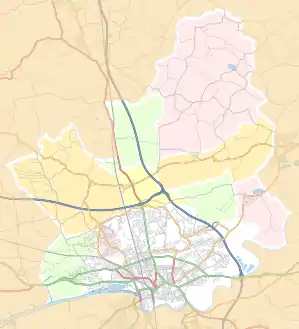City of Preston, Lancashire
Preston (/ˈprɛstən/ ⓘ),[1] commonly known as the City of Preston, is a local government district with city status in Lancashire, England. It lies on the north bank of the River Ribble and has a population of 147,617 (2021).[2][3] The neighbouring districts are Ribble Valley, South Ribble, Fylde and Wyre.
City of Preston | |
|---|---|
| Preston | |
Beacon Fell is the highest point in the district | |
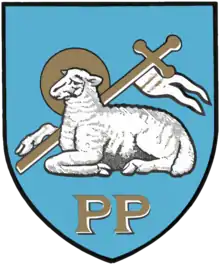 Coat of Arms of the City Council | |
| Nickname: Proud Preston | |
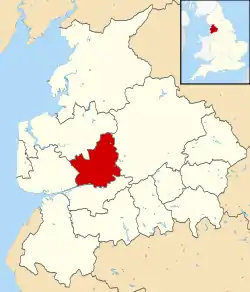 Shown within Lancashire and England | |
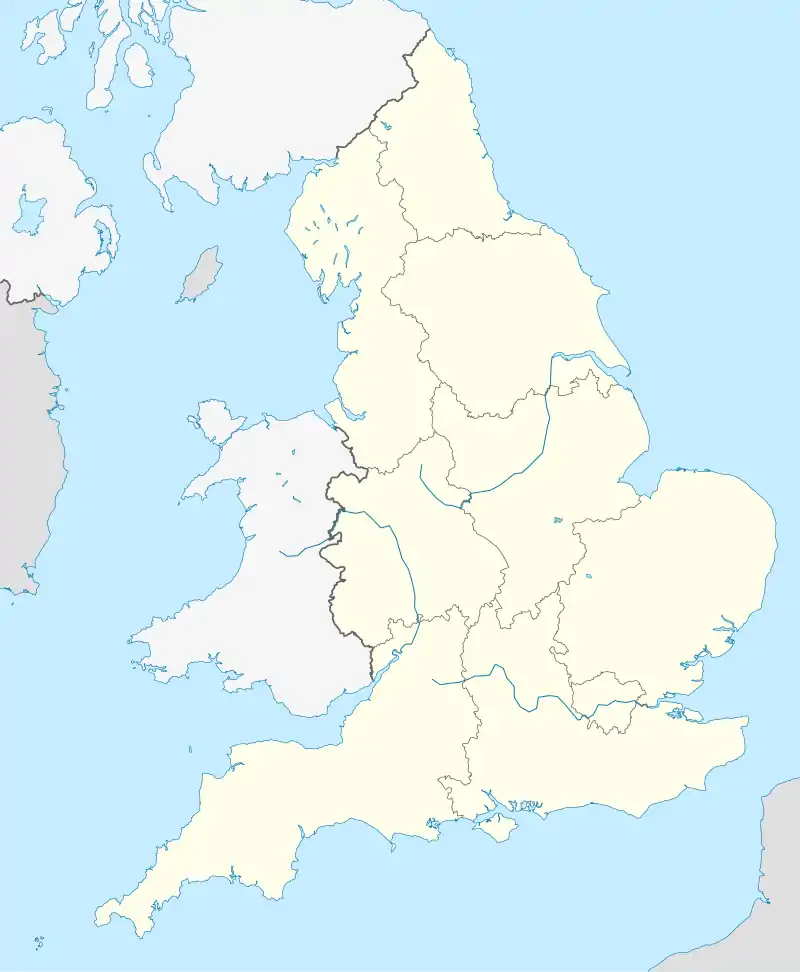 City of Preston Shown within England | |
| Coordinates: 53°45′N 2°42′W | |
| Country | United Kingdom |
| Country | England |
| Region | North West England |
| County | Lancashire |
| Guild Merchant charter | 1179 |
| City status | 2002 |
| Government | |
| • Type | Non-metropolitan district |
| • Local Authority | Preston City Council |
| • Leadership: | Leader & Cabinet |
| • MPs: | Mark Hendrick (Lab), Ben Wallace (Con), Mark Menzies (Con) |
| Area | |
| • City & Non-metropolitan district | 54.9 sq mi (142.3 km2) |
| Highest elevation | 873 ft (266 m) |
| Lowest elevation | 0 ft (0 m) |
| Population (2021) | |
| • City & Non-metropolitan district | 147,617 (Ranked 148th) |
| • Density | 2,690/sq mi (1,037/km2) |
| • Urban | 365,000 (Central Lancashire) |
| • Ethnicity | 82.3% White British 11.6% S.Asian British 2.6% White Other 1.1% White Irish 1.5% Mixed Race 1.1% Black British 1.0% E.Asian and Other |
| Time zone | UTC+0 (Greenwich Mean Time) |
| Postcode | |
| Area code(s) | 01772, 01995 |
| ISO 3166-2 | GB-LAN |
| ONS code | 30UK (ONS) E07000123 (GSS) |
| OS grid reference | SD535295 |
| Demonym | Prestonian |
The district is named after its largest settlement, Preston, which lies in the south of the district. The district also includes rural areas to the north of the main urban area, including part of the Forest of Bowland, a designated Area of Outstanding Natural Beauty. In 2002 the district was granted city status to mark the Golden Jubilee of Elizabeth II; prior to this it was known as the Borough of Preston, having held borough status since its creation in 1974.[4][5]
History
The town of Preston was an ancient borough, having been granted its first charter by Henry II in 1179.[6] The borough was reformed in 1836 to become a municipal borough under the Municipal Corporations Act 1835. When elected county councils were established in 1889 under the Local Government Act 1888, Preston was considered large enough to run its own county-level services and so it became a county borough, independent from Lancashire County Council.[7]
In 1970 the New Town of Central Lancashire was designated, covering all of the county borough of Preston and parts of the districts of Chorley, Fulwood, Leyland, Walton-le-Dale, Chorley Rural District and Preston Rural District. The Central Lancashire Development Corporation was established to oversee the development of the new town, taking over town planning responsibilities from the local councils.[8]
The current district of Preston was formed on 1 April 1974 under the Local Government Act 1972, covering the whole area of two former districts and a large part of a third, which were all abolished at the same time:[9][10][11]
- Fulwood Urban District
- Preston County Borough
- Preston Rural District (part, being the parishes of Barton, Broughton, Goosnargh, Grimsargh, Haighton, Lea, Whittingham and Woodplumpton, rest of district split between Ribble Valley and South Ribble.)
The new district was a non-metropolitan district, forming a lower tier of local government with Lancashire County Council providing county-level services. The district was awarded borough status from its creation, allowing the chair of the council to take the title of mayor, continuing Preston's sequence of mayors which dates back to at least the fourteenth century.[6][12] In other new towns across England the 1974 reforms brought the whole designated area for the new town within a single district, but the Central Lancashire New Town was allowed to straddle the new districts of Preston, South Ribble and Chorley.[9] The Development Corporation was wound up in 1986 and planning powers transferred to the local councils.[13]
In 2002 the borough of Preston was awarded city status to mark the Golden Jubilee of Elizabeth II. The council therefore changed its name from Preston Borough Council to Preston City Council.[14][15] Like numerous other places granted city status since 1889, Preston has no Anglican cathedral. Instead, following the granting of city status, Preston's parish church was elevated by the Church of England to the status of Minster Church in June 2003.[16]
Governance
Preston City Council | |
|---|---|
 | |
| Leadership | |
Adrian Phillips since April 2019[19] | |
| Structure | |
| Seats | 48 councillors[20] |
Political groups |
|
| Elections | |
Last election | 4 May 2023 |
Next election | 2024 |
| Meeting place | |
 | |
| Town Hall, Lancaster Road, Preston, PR1 2RL | |
| Website | |
| www | |
Preston City Council provides district-level services. County-level services are provided by Lancashire County Council.[22] Parts of the district are also covered by civil parishes, which form a third tier of local government.[23]
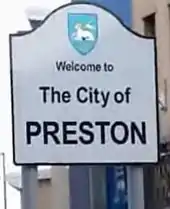
Political control
The council has been under Labour majority control since 2011.
The first election to the enlarged Preston Borough Council created by the Local Government Act 1972 was held in 1973, initially operating as a shadow authority alongside the outgoing authorities until the new arrangements came into effect on 1 April 1974. Political control of the council since 1974 has been as follows:[24][25]
| Party in control | Years | |
|---|---|---|
| Labour | 1974–1976 | |
| Conservative | 1976–1980 | |
| Labour | 1980–1999 | |
| No overall control | 1999–2011 | |
| Labour | 2011–present | |
Leadership
The role of mayor is largely ceremonial in Preston. Political leadership is instead provided by the leader of the council. The leaders since 1992 have been:[26]
| Councillor | Party | From | To | |
|---|---|---|---|---|
| David Borrow | Labour | 1992 | 1994 | |
| Valerie Wise[27] | Labour | 1994 | 1995 | |
| David Borrow | Labour | 1995 | 1997 | |
| Peter Rankin | Labour | 1997 | 2000 | |
| Ian Hall | Labour | 2000 | 15 May 2003 | |
| John Collins | Labour | 15 May 2003 | 16 May 2007 | |
| Ken Hudson | Conservative | 16 May 2007 | 18 May 2011 | |
| Peter Rankin | Labour | 18 May 2011 | 6 May 2018 | |
| Matthew Brown | Labour | 16 May 2018 | ||
Composition
Following the 2023 election, the composition of the council was:[28]
| Party | Councillors | |
|---|---|---|
| Labour | 31 | |
| Conservative | 10 | |
| Liberal Democrats | 7 | |
| Total | 48 | |
The next election is due in 2024.
Premises
The council is based at Preston Town Hall on Lancaster Road, which was built in 1934 for the old county borough council.[29][30]
Elections
Since the last boundary changes in 2019 the council has comprised 48 councillors representing 16 wards, with each ward electing three councillors. Elections are held three years out of every four, with a third of the council (one councillor for each ward) being elected at a time for a four-year term. Lancashire County Council elections are held in the fourth year of the cycle when there are no city council elections.[31]
Wider politics
The City of Preston is currently divided between three Westminster constituencies, namely Preston, Wyre and Preston North, and Fylde. The three seats are all safe seats, with all Members of Parliament holding over 50% of the vote for their respective parties.
Historically, Preston has been divided between such constituencies as Preston North, Preston South, and Fylde South, although until 1885 it comprised one constituency called Preston, which actually included most of West Lancashire.
Geography
Physical geography
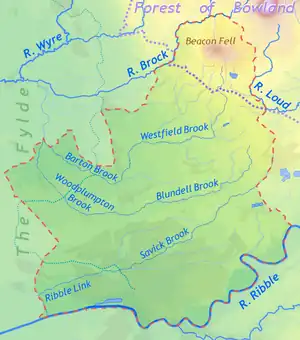
The City of Preston district is a transitional region between coastal plain, river valley and moorland. The west of the district lies within the flat coastal plain of the Fylde. The southern border is the River Ribble which meanders through a flood plain in a wide, steep-sided valley. The northeast of the district lies within the Forest of Bowland Area of Outstanding Beauty.
The highest point is the summit of Beacon Fell at 266 m (873 ft) above sea level, an isolated fell two miles south of the main range of Bowland Fells just outside the district boundaries. The lowest point lies on the River Ribble in the southwest corner of the district. The Ribble here is tidal and therefore virtually at sea level. The course of the river west of Preston was artificially straightened in the 19th century, to ease passage of shipping to the docks.
The southern one-third of the district, most of which is covered by Preston and its suburbs, drains into Savick Brook running east-to-west and then turning south into the Ribble. The lowest section of the brook has been widened into the Ribble Link which connects the Lancaster Canal to the Ribble. The central and northern parts of the district drain into south- and west-flowing tributaries of the River Brock, itself a tributary of the Wyre whose estuary is at Fleetwood. The Brock forms part of the district boundary on the west and north sides of Beacon Fell. A small part of the district along the eastern boundary drains into the east-flowing River Loud, a tributary of the Hodder.
The lowland area in the north and east of the district, between Beacon Fell and the Fylde, is a dairy farming area, particularly noted for its cheesemaking dairies. Six of the ten Lancashire Cheese dairies listed on the British Cheese Board's website in 2011 are located in the City of Preston district (and the other four are only a few miles outside).[32] Beacon Fell Traditional Lancashire Cheese is a Protected Designation of Origin cheese named after Beacon Fell.[33]
At 53°45′N 2°42′W, Preston city centre is approximately 27 miles north west of Manchester, 26 miles north east of Liverpool, and 15 miles east of the coastal town Blackpool.
Like most of inland Lancashire, Preston receives a higher than UK average total of rainfall, and is slightly colder. On 10 August 1893 Preston entered the UK Weather Records, with the Highest 5-min total rainfall of 32 mm. As of November 2008 this remains a record.[34]
Demography
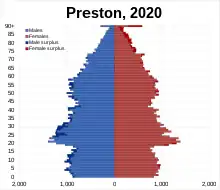
Ethnicity
Preston is a diverse city, although the majority of the ethnic minorities are South Asians, in particular Indians. The ethnic makeup of Preston based on the 2011 census is as follows (With average for England in brackets): 75.8% White British (79.8%), 0.8% White Irish (1.0%), 3.5% Other White (4.6%). 2.3% Mixed Race (2.2%). 10.3% Indian (2.6%), 3.2% Pakistani (2.1%), 0.3% Bangladeshi (0.8%), 0.9% Other Asian (1.5%). 0.6% Black Caribbean (1.1%), 0.5% Black African (1.8%), 0.1% Other Black (0.5%). 0.9% Chinese (0.7%), 0.4% Arab (0.4%) and 0.3% other (0.6%).[35]
| Ethnic Group | 1981 estimations[36] | 1991[37] | 2001[38] | 2011[39] | 2021[40] | |||||
|---|---|---|---|---|---|---|---|---|---|---|
| Number | % | Number | % | Number | % | Number | % | Number | % | |
| White: Total | 111,083 | 91% | 113,209 | 89.8% | 110,848 | 85.5% | 112,415 | 80.2% | 107,321 | 72.6% |
| White: British | – | – | – | – | 107,810 | 83.1% | 106,242 | 75.8% | 97,715 | 66.1% |
| White: Irish | – | – | – | – | 1,539 | 1,178 | 923 | 0.6% | ||
| White: Gypsy or Irish Traveller | – | – | – | – | – | – | 111 | 114 | 0.1% | |
| White: Roma | – | – | – | – | – | – | – | – | 248 | 0.2% |
| White: Other | – | – | – | – | 1,499 | 4,884 | 8,321 | 5.6% | ||
| Asian or Asian British: Total | – | – | 10,703 | 8.5% | 15,613 | 12% | 21,732 | 15.5% | 29,815 | 20.2% |
| Asian or Asian British: Indian | – | – | 8,205 | 11,436 | 14,421 | 19,047 | 12.9% | |||
| Asian or Asian British: Pakistani | – | – | 1,722 | 2,746 | 4,425 | 7,554 | 5.1% | |||
| Asian or Asian British: Bangladeshi | – | – | 176 | 308 | 375 | 758 | 0.5% | |||
| Asian or Asian British: Chinese | – | – | 195 | 546 | 1,235 | 707 | 0.5% | |||
| Asian or Asian British: Other Asian | – | – | 405 | 577 | 1,276 | 1,749 | 1.2% | |||
| Black or Black British: Total | – | – | 1,529 | 1.2% | 1,182 | 0.9% | 1,676 | 1.2% | 3,489 | 2.4% |
| Black or Black British: Caribbean | – | – | 902 | 878 | 865 | 827 | 0.6% | |||
| Black or Black British: African | – | – | 122 | 216 | 661 | 2,355 | 1.6% | |||
| Black or Black British: Other Black | – | – | 505 | 88 | 150 | 827 | 0.6% | |||
| Mixed or British Mixed: Total | – | – | – | – | 1,737 | 1.3% | 3,326 | 2.4% | 4,367 | 3.0% |
| Mixed: White and Black Caribbean | – | – | – | – | 950 | 1,627 | 1,759 | 1.2% | ||
| Mixed: White and Black African | – | – | – | – | 97 | 300 | 506 | 0.3% | ||
| Mixed: White and Asian | – | – | – | – | 450 | 931 | 1,321 | 0.9% | ||
| Mixed: Other Mixed | – | – | – | – | 240 | 468 | 781 | 0.5% | ||
| Other: Total | – | – | 641 | 0.5% | 253 | 0.2% | 1,053 | 0.8% | 2,842 | 1.9% |
| Other: Arab | – | – | – | – | – | – | 626 | 1,157 | 0.8 | |
| Other: Any other ethnic group | – | – | 641 | 0.5% | 253 | 0.2% | 427 | 1,685 | 1.1 | |
| Ethnic minority: Total | 10,999 | 9% | 12,873 | 10.2% | 18,785 | 14.5% | 27,787 | 19.8% | 40,513 | 27.4% |
| Total | 122,082 | 100% | 126,082 | 100% | 129,633 | 100% | 140,202 | 100% | 147,834 | 100% |
Child poverty
In 2008 a survey revealed that 50% of all children living in the city were living in families suffering from financial depression. An estimated 15,380 youngsters were part of the families on the breadline. The Campaign to End Child Poverty report defined children in poverty as children living in homes where occupants work less than 16 hours a week, or not at all, or where the full amount of tax credit is being claimed. The city was one of the most severely affected areas of the North West outside Liverpool and Manchester, with 21% of children in the city living in households which were completely workless and a further 29% in families struggling to get by with working tax credits. The two worst affected areas of the city were the Deepdale and St George's wards, where 75% and 77% of children respectively were said to be living in poverty.[41]
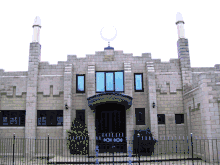
Religion
The City of Preston lies in the Roman Catholic Diocese of Lancaster and the Anglican Diocese of Blackburn.
In July 2016, St Ignatius Church in Preston, which had been gifted by the Catholic Diocese of Lancaster to the Syro-Malabar Catholic community, was raised to the status of a cathedral by Pope Francis. It now serves as the seat of the Syro-Malabar Catholic Eparchy of Great Britain[42][43]
The 2001 Census recorded 72% of the population as Christians, 10% as having no religion, and 8% as Muslim.[44] The Hindu and Sikh populations are smaller at 3% and 0.6% respectively, but in both cases this represents the highest percentage of any local authority area in the North West. 2% of the city's population were born in other EU countries.
Towns and parishes
The main urban area, broadly covering the combined area of the pre-1974 Preston County Borough and Fulwood Urban District, is an unparished area. The remainder of the district is divided into nine civil parishes:
- Barton
- Broughton
- Goosnargh
- Grimsargh
- Haighton
- Ingol and Tanterton (neighbourhood, created April 2012)
- Lea
- Whittingham
- Woodplumpton
Freedom of the City
Freedom of the City has been granted to:
- The Loyal Regiment (North Lancashire) – 7 August 1952; this was subsequently transferred to The Queen's Lancashire Regiment on 9 September 1972
- Sir Tom Finney, Preston football player – 6 September 1979[45]
- The Duke of Lancaster's Regiment – 1 July 2006
- Ian Hall J.P., – Councillor, May 1992[46]
- Nick Park, – film maker, October 1997
- Andrew Flintoff, England cricket captain, – January 2006
- Ken Hudson JP MBE, Mayor 1993–1994, Leader of the City 2007–2011, admitted in recognition of his 36 years' service to the council and the citizens of Preston, August 2014.
References
- "Local Authority Districts, Counties and Unitary Authorities (April 2021) Map in United Kingdom". Office for National Statistics: Open Geography Portal. Retrieved 1 August 2023.
- "Labour Market Profile - Nomis - Official Census and Labour Market Statistics". www.nomisweb.co.uk. Retrieved 18 May 2023.
- "Mid-Year Population Estimates, UK, June 2021". Office for National Statistics. 21 December 2022. Retrieved 18 October 2023.
- "District Councils and Boroughs". Parliamentary Debates (Hansard). 28 March 1974. Retrieved 16 January 2012.
- "Table III(a)". Local Government in England and wales. a Guide to the New System. London: HMSO. 1974. pp. 15–109. ISBN 0117508470.
- "The background to the Mayor of Preston". Preston City Council. Retrieved 27 June 2023.
- "Preston Municipal Borough / County Borough". A Vision of Britain through Time. GB Historical GIS / University of Portsmouth. Retrieved 27 June 2023.
- "No. 45079". The London Gazette. 14 April 1970. p. 4187.
- "The English Non-metropolitan Districts (Definition) Order 1972", legislation.gov.uk, The National Archives, SI 1972/2039, retrieved 27 June 2023
- "Lancashire Diagram showing Administrative Boundaries, 1969". National Library of Scotland. Ordnance Survey. Retrieved 27 June 2023.
- "The English Non-metropolitan Districts (Names) Order 1973", legislation.gov.uk, The National Archives, SI 1973/551, retrieved 31 May 2023
- "District Councils and Boroughs". Parliamentary Debates (Hansard). 28 March 1974. Retrieved 16 January 2012.
- "Dissolution of the corporation". Discovery Catalogue. The National Archives. Retrieved 27 June 2023.
- "Crown Office". London Gazette. 15 May 2002. Retrieved 27 June 2023.
- "'Proud Preston' wins city status Archived 2007-08-22 at the Wayback Machine", BBC News, 14 March 2002. Retrieved 6 June 2006.
- Preston Saint John's Receives 'Minster' Status, Ringing-Online, retrieved 24 August 2011
- Faulkner, Paul (31 May 2023). "Preston's new mayor who is making headlines in his native India". Lancs Live. Retrieved 26 June 2023.
- "Council minutes, 17 May 2018" (PDF). Preston City Council. Retrieved 24 August 2022.
- Hodgson, Neil (23 April 2019). "Preston City Council confirms Adrian Phillips as chief executive". The Business Desk. Retrieved 26 June 2023.
- "Open Council Data UK - compositions councillors parties wards elections". opencouncildata.co.uk.
- "Open Council Data UK - compositions councillors parties wards elections". opencouncildata.co.uk.
- "Local Government Act 1972", legislation.gov.uk, The National Archives, 1972 c. 70, retrieved 31 May 2023
- "Election maps". Ordnance Survey. Retrieved 6 June 2023.
- "Compositions calculator". The Elections Centre. 4 March 2016. Retrieved 1 June 2023.
- "Preston". BBC News Online. 19 April 2008. Retrieved 26 October 2009.
- "Council minutes". Preston City Council. Retrieved 24 August 2022.
- Hattersley, Roy (24 March 2001). "Prudent policies bring back pride". The Guardian. Retrieved 24 August 2022.
- "Local elections 2023: live council results for England". The Guardian.
- Historic England. "Town Hall, Lancaster Road (1207297)". National Heritage List for England. Retrieved 29 November 2020.
- "Contact us". Preston City Council. Retrieved 27 June 2023.
- "The Preston (Electoral Changes) Order 2018", legislation.gov.uk, The National Archives, SI 2018/548, retrieved 27 June 2023
- Butler's, JJ Sandhams, Greenfields, Mrs Kirkham's, Shorrocks and Carron Lodge, The Lancashire Dairies Archived 26 July 2011 at the Wayback Machine, British Cheese Board, accessed 4 August 2011
- EU Protected Food Names Scheme: Beacon Fell traditional Lancashire cheese Archived 22 March 2012 at the Wayback Machine, DEFRA, retrieved 4 August 2011
- "Extreme Weather". Met Office. Archived from the original on 29 December 2010. Retrieved 17 July 2010.
- UK Census (2011). "Local Area Report – Preston Local Authority (1946157097)". Nomis. Office for National Statistics. Retrieved 19 March 2018.
- Equality, Commission for Racial (1985). "Ethnic minorities in Britain: statistical information on the pattern of settlement". Commission for Racial Equality: Table 2.1.
- Data is taken from United Kingdom Casweb Data services of the United Kingdom 1991 Census on Ethnic Data for England, Scotland and Wales (Table 6)
- "Office of National Statistics; 2001 Census Key Statistics". webarchive.nationalarchives.gov.uk. Retrieved 7 September 2021.
- "2011 Census: Ethnic Group, local authorities in England and Wales". webarchive.nationalarchives.gov.uk. Retrieved 15 December 2021.
- "TS021 - Ethnic group - Nomis - Official Census and Labour Market Statistics". www.nomisweb.co.uk. Retrieved 18 May 2023.
- "New survey reveals children's deprivation - News". lep.co.uk. 16 October 2008. Archived from the original on 3 August 2012. Retrieved 17 July 2010.
- "Pope creates new eparchy in Preston for Syro-Malabar Catholics". Catholic Herald. Archived from the original on 30 July 2016. Retrieved 30 July 2016.
- "Pope turns ex-Preston church into Indian Catholic cathedral". BBC News. Archived from the original on 10 December 2018. Retrieved 21 June 2018.
- Census 2001: Statistics. Archived 29 June 2011 at the Wayback Machine. Retrieved 6 June 2006.
- "Honorary Freemen | Preston City Council". www.preston.gov.uk. Archived from the original on 27 June 2018. Retrieved 19 February 2019.
- "Honorary Freemen - Preston City Council". www.preston.gov.uk. Archived from the original on 11 January 2015. Retrieved 16 June 2014.
External links
 Preston travel guide from Wikivoyage
Preston travel guide from Wikivoyage- Preston City Council website
